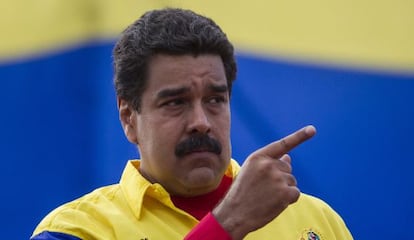Fears rise in Venezuela over Maduro’s reaction to possible electoral defeat
President has ramped up verbal attacks against his critics in recent days He has also started a campaign to galvanize disenchanted voters

Venezuelans are becoming increasingly concerned about what may happen during and after Sunday’s parliamentary elections. Voter polls say the opposition will win, which would put the chavista regime in an unusual situation after 17 years in power. Critics say they cannot predict how the Nicolás Maduro administration will react, while the government has escalated its persecution of business leaders over the last few days of the campaign.
If the nightmare were to come true and we were to lose, the revolution would acquire new methods and a different character” President Maduro
“If the nightmare were to come true and we were to lose, the revolution would acquire new methods and a different character,” the president said on his weekly television show on Tuesday. “If we lose the elections, the revolution will continue and we will keep fighting from the streets.” The opposition has interpreted these statements as threats similar to those he made weeks ago when he told voters the regime must win “at all costs.”
This marks the first time that Maduro – whose approval rating has hit rock bottom compared to his predecessor, Hugo Chávez – has clearly acknowledged the possibility that the regime might lose its parliamentary majority. According to the polls, the opposition will gain total control in Congress, yet everything suggests that, if it wins, it will be by a slim margin. With a simple majority – 84 seats – it will be difficult for the opposition to call for a revocatory referendum or pass an amnesty law for political prisoners, its top two campaign promises.
Ex-Spanish PM Zapatero coming “to help things run smoothly”
Former Spanish Prime Minister José Luis Rodríguez Zapatero arrived in Caracas on Tuesday at the invitation of the Venezuelan president and the National Electoral Council (CNE) as an international observer. The Spanish politician held one of his first meetings on the ground with Venezuelan Foreign Affairs Minister Delcy Rodríguez.
According to the website of the Venezuelan Ministry of Foreign Affairs, the ex-prime minister said his role is “to help things run smoothly and maintain the highest level of understanding and cordiality; there should be no interference in the domestic affairs of a country.”
“My task, my spirit, my way of approaching this electoral process will be with humility, with respect for the sovereignty of the people of Venezuela and helping so that election day responds to the best democratic principles of transparency and guaranty,” he said to the local media.
Minister Rodríguez said the meeting with Zapatero was “very sincere” and that he will meet with President Maduro before Sunday’s elections. Some opposition leaders have also confirmed their desire to meet with the Spanish politician.
The former prime minister is expected to be in Venezuela until December 8.
In light of the regime’s possible defeat, Maduro has escalated his verbal attacks against critics and started a campaign to galvanize disenchanted voters. About a week before election day, the president announced 50 new construction projects in several states.
More shortages
Sunday’s elections come at at a low point in the food-shortage crisis that has plagued Venezuelan markets for the last two years. The Maduro administration seems intent on taking advantage of this situation at the polls by blaming business leaders. “Bandit... You are a devil. And every devil will get his due of holy water,” he said in reference to Lorenzo Mendoza Giménez, a Venezuela native who owns the country’s largest company, Empresas Polar. Mendoza has appeared on Forbes’ Billionaires List.
During a closing campaign event in Barquisimeto (midwest Venezuela), Maduro said he had ordered the arrest of a supermarket manager in Guarenas, a commuter town in east Caracas. The president told the crowd he was on tour in the area when he noticed a long line of people waiting to enter Plaza’s. “I sent someone to investigate immediately and they discovered the manager had ordered the doors closed to create a line and make people suffer. That’s one of their psychological tactics. I immediately sent a Sebin [intelligence service] team and they arrested him. They’ll call me a dictator but I don’t care. Justice must be done.”
English version by Dyane Jean Francois.
Tu suscripción se está usando en otro dispositivo
¿Quieres añadir otro usuario a tu suscripción?
Si continúas leyendo en este dispositivo, no se podrá leer en el otro.
FlechaTu suscripción se está usando en otro dispositivo y solo puedes acceder a EL PAÍS desde un dispositivo a la vez.
Si quieres compartir tu cuenta, cambia tu suscripción a la modalidad Premium, así podrás añadir otro usuario. Cada uno accederá con su propia cuenta de email, lo que os permitirá personalizar vuestra experiencia en EL PAÍS.
¿Tienes una suscripción de empresa? Accede aquí para contratar más cuentas.
En el caso de no saber quién está usando tu cuenta, te recomendamos cambiar tu contraseña aquí.
Si decides continuar compartiendo tu cuenta, este mensaje se mostrará en tu dispositivo y en el de la otra persona que está usando tu cuenta de forma indefinida, afectando a tu experiencia de lectura. Puedes consultar aquí los términos y condiciones de la suscripción digital.








































